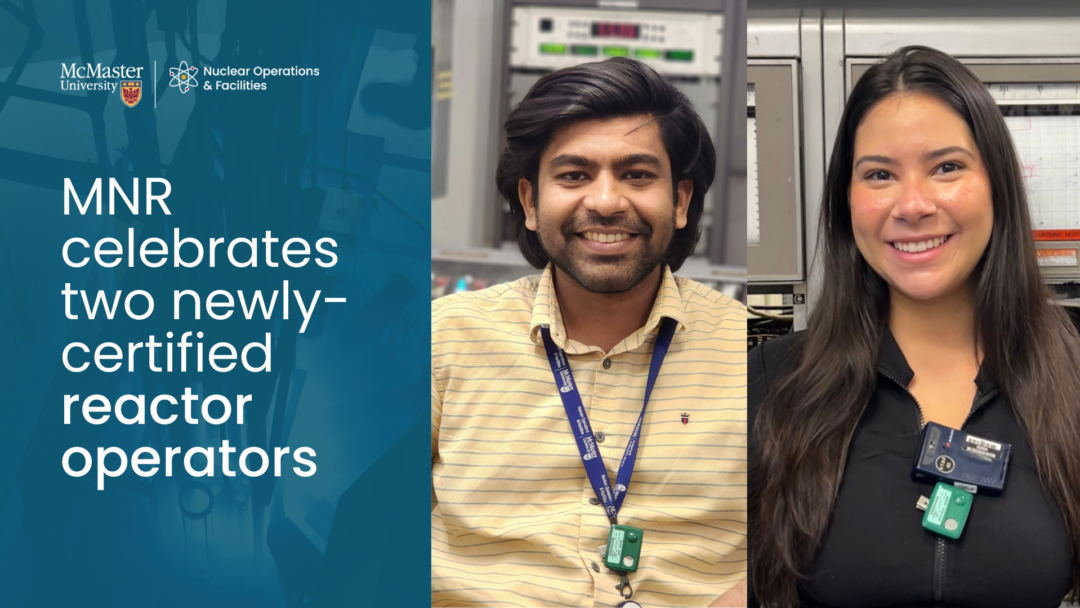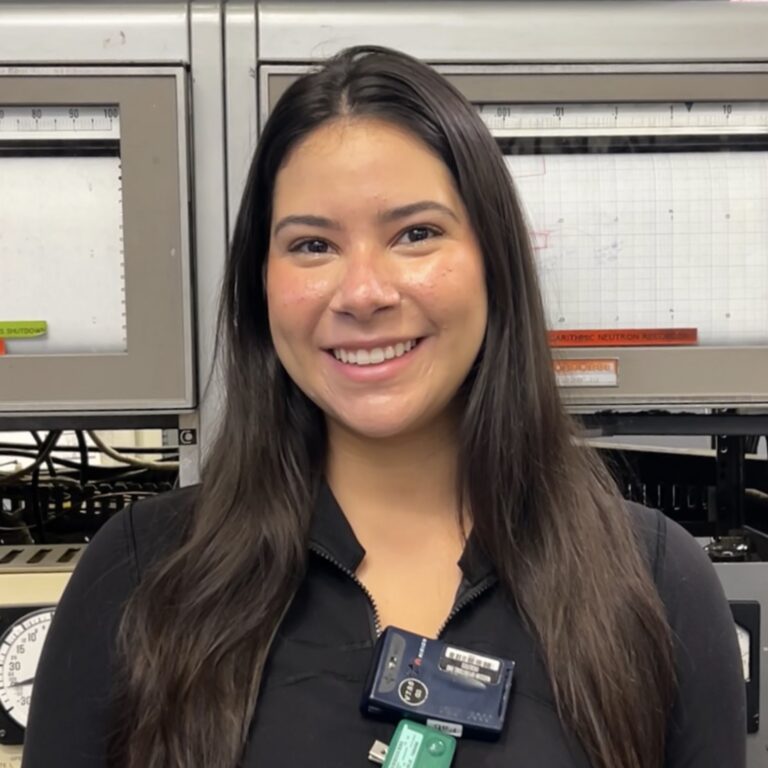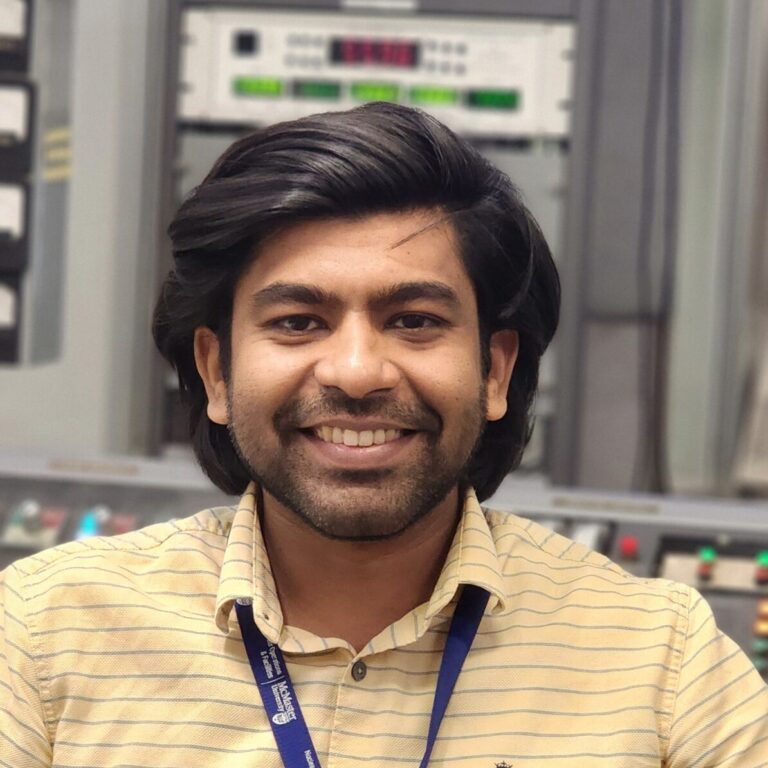McMaster Nuclear Reactor celebrates two newly-certified reactor operators

Nuclear Operations & Facilities (NO&F) is thrilled to announce that two of our reactor operators-in-training have received certification from the Canadian Nuclear Safety Commission (CNSC).
Reactor operators play an essential role in the day-to-day activities at the McMaster Nuclear Reactor (MNR). From inside the control room and on the experimental floor, operators ensure the reactor continues to function efficiently and safely.
Fabiana Silva Velis and Sachin Jose have spent over 480 hours in the reactor building as assistant operators, learning the ropes and gaining hands-on experience in reactor operations – from monitoring and regulating the reactor’s power output to inserting samples in the reactor core for irradiation. Their certification journey culminated in a 6-hour exam reviewed and approved by the CNSC.
Thanks to their hard work and dedication, Fabiana and Sachin received certification from the CNSC last month, making them MNR’s newest certified reactor operators.
Sachin graduated from Christ University, Bangalore with a Bachelor of Technology degree in mechanical engineering. He joined the MNR operations team in 2022.
Fabiana studied chemical production and power engineering at Lambton College and began working at MNR as an assistant operator in 2022.
With reactor operations recently increased to 24 hours a day, 5 days a week, MNR’s talented operators will continue play an essential role in the facility going forward, says McMaster’s Chief Nuclear Officer and Associate Vice-President, Nuclear, Dave Tucker.
“My sincere congratulations to Fabiana and Sachin on this remarkable achievement. I know this is just the beginning of their professional journeys in nuclear; we look forward to witnessing their careers flourish at MNR and beyond. And as Canada’s Nuclear University, McMaster looks forward to continuing to build a young, diverse nuclear workforce that will help position Canada for a cleaner, healthier future powered by nuclear innovation,” he says.
Derek Cappon, McMaster’s Director, Reactor Operations & Maintenance congratulates Fabiana and Sachin on their certification success and welcomes them as the newest certified members of MNR’s operator crew.
“Our operators’ detailed knowledge of the reactor and all of its systems is what keeps it running safely and smoothly, so that staff, faculty and trainees can continue to advance medical isotope production, clean energy and materials research,” he says.
Read our Q&A with Fabiana and Sachin below and learn more about the pathway to becoming a reactor operator.

Q&A with Fabiana Silva Velis, Reactor Operator at MNR
What made you want to pursue a career in nuclear science?
I’ve always been interested in nuclear science. When looking at different industries that I might want to work in, nuclear energy stood out to me because it aligned with many of my values. Nuclear energy is so important because it provides clean power – it produces near-zero CO2 emissions. The industry also prioritizes the safety of people and the environment. At the McMaster Nuclear Reactor, there are radiation safety programs in place to ensure we’re protecting ourselves and others while doing our everyday jobs on campus.
What do you enjoy most about being a reactor operator?
I enjoy working with the control system. It’s very interesting, especially since some of our control components are the same or similar to how they were back in the day. The system is specific to the McMaster Nuclear Reactor, so there are things that the classroom or standard training doesn’t teach you that you get to learn on the job.
Everything I know about MNR is thanks to my supervisors, who took the time to teach me about it – how it functions and how it’s operated. We need to prepare for every possible scenario – even the most unlikely – so thinking of all the ways to prevent faults or correct them if needed in our control room is pretty interesting.
What are some key skills or qualities that reactor operators need for the job?
Problem solving is super relevant because operators work with so many systems and different kinds of instrumentation at the same time. Operators are required to respond promptly to any tasks or issues that may arise on the job, so having the ability to respond quickly to situations is very important.
You also need to be able to connect and communicate with the people around you. Operators at MNR work shifts of up to 12 hours, so it’s really helpful to build rapport with your team and be open and honest if you need help. Operators also work with researchers, scientists, engineers and technicians, so it’s important to keep an open line of communication with everyone in the reactor.
What advice would you give to aspiring reactor operators, or students interested in pursuing a career in the nuclear field?
Try to stay as involved as you can! There are some great resources online about nuclear and there are conferences open to students where you can network with people in the industry and learn more about career opportunities. Keep yourself educated about the field – review the basics but also be open to learning new things. Nuclear science is pretty cool, but a reactor is composed of so many associated systems and those are equally important to learn about if you’re planning to become a reactor operator.

Q&A with Sachin Jose, Reactor Operator at MNR
What do reactor operators at MNR do?
Operators are responsible for ensuring the safe operation of the reactor. On an average day, we monitor the reactor and conduct routine maintenance. The most important aspect of our job is making sure that all the work being done inside the reactor is completed within the regulatory limits to ensure the safety of all those who work inside and visit the facility.
Tell us about the operator training process.
During the training process I worked as an assistant operator, which gave me an opportunity to practice a lot of daily operational procedures under the supervision of MNR’s licenced operators. During this period, I went through a series of examinations, in-class and on-site training sessions and interviews – all leading up to taking my operator certification exam.
The process for becoming a certified operator is unique and extensive – mainly because operators require in-depth knowledge about the entire reactor, including the containment building systems, nuclear physics, reactor control systems, health physics, safety and security and the many other supporting systems we have in place for reactor operations. Having this knowledge ensures that operators can take quick and effective action to handle any and every situation.
It was helpful to test my knowledge and responses and participate in mock drills, exercises and day-to-day procedures – all of this really boosts operators’ confidence and ability to work collectively to manage the facility.
What are you most looking forward to in your new role as a certified operator?
I consider myself blessed and thankful to be joining MNR as a certified operator and to be part of the 24/5 transition. My achievement is thanks to the combined support of MNR and Health Physics management, and the operations team especially for investing time and effort in my education and training journey.
Getting certified doesn’t mean it’s the end of learning; there is a lot of continued leaning required, especially with a new operating schedule and exciting new research projects at the reactor. MNR plays a major role in advanced nuclear R&D for so many different industries and academic discoveries. Operators play an indirect but important role in facilitating their work, which gives us a wide range of experience and opportunities to learn new things.
What advice would you give to aspiring reactor operators, or students interested in pursuing a career in the nuclear field?
There are a lot of students who may think the nuclear sector only involves power generation, and that career opportunities are limited to those who studied nuclear science or engineering. From my experience working at MNR, I can say that this industry is huge. Many industries use nuclear technologies as part of their production processes and in research and development – from health and medicine to food and agriculture, civil engineering, aerospace and much more. These nuclear-integrated industries create a lot of opportunities, not only for science and engineering, but also in management, logistics and marketing. There’s something for everyone in nuclear.
The pathway to certification
The pathway to becoming a reactor operator involves a significant amount of initial and ongoing training, including regular recertification every five years.
Due to MNR’s unique design, operator training takes place almost entirely inside the reactor building. Reactor operators are trained in the relevant science fundamentals, reactor physics, radiation protection and safety programs, and equipment operation and repair.
In addition to training, candidates are required to operate reactor controls under the supervision of a certified operator for a minimum of 480 hours.
Once they have completed their training, candidates undergo oral exams conducted by McMaster’s Reactor Manager and Senior Health Physicist. If successful, they are required to sit for a 6-hour written certification examination which is reviewed and approved by CNSC staff, as well as NO&F’s Operations Director and Training Manager. After careful review of each candidate’s training records and exam score, the CNSC grants the candidate certification.
By the time they are certified, MNR’s reactor operators have participated in approximately 2,500 hours of training and have completed at least 25 comprehensive written and on-the-job evaluations.
Nevertheless, every five years each reactor operator is required to undergo recertification, writing a new exam to ensure continued excellence in operations.
